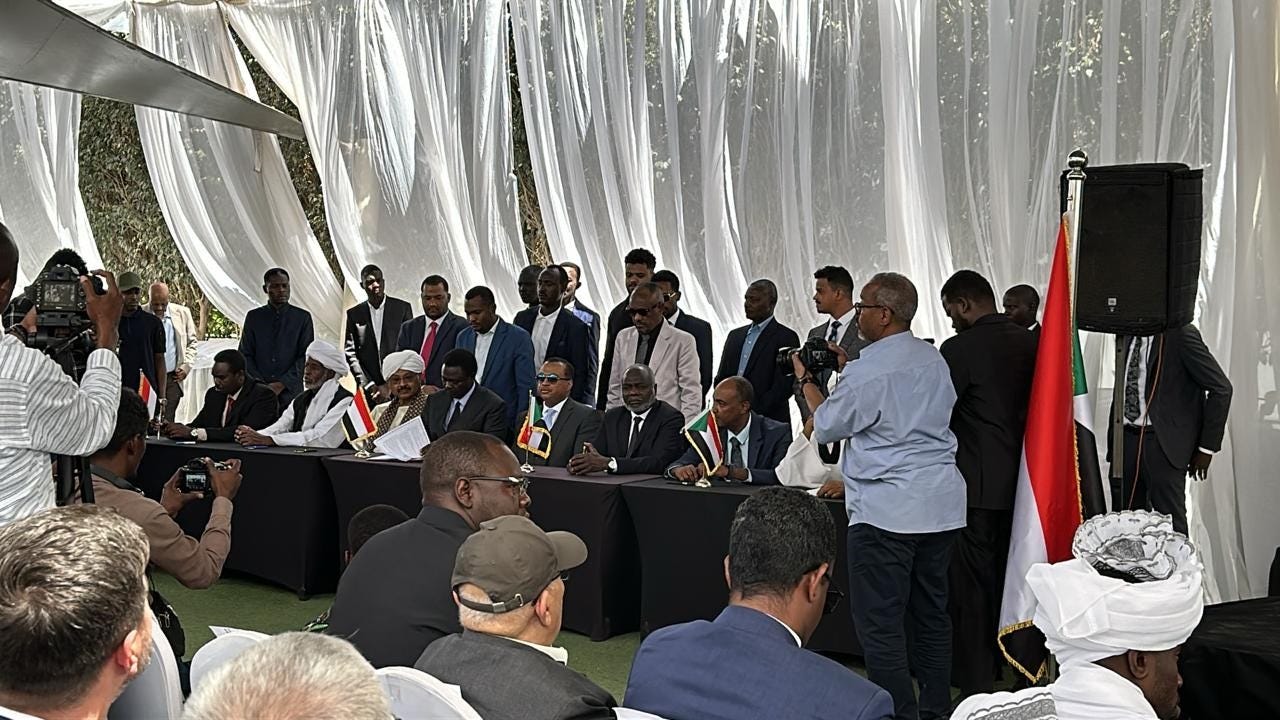Pro-SAF political bloc launches in Cairo
New Sudanese bloc pushes for military-backed transition, domestic dialogue
A new political bloc emerged in Sudan's complex political landscape on Wednesday, advocating for a renewed transitional period and a domestically-driven national dialogue. The Sudan Charter Forces (SCF), a group of 48 political and armed organizations largely supportive of the Sudanese Armed Forces (SAF), announced their formation in the Egyptian capital Cairo.
The bloc's proposals drew skepticism from a main pro-democracy group who question the SCF's independence from the military and apparent contradictions, such as supporting the SAF against the RSF while advocating for talks between them.
The SCF, whose signatories include mainstream political parties and armed movements (such as the Democratic Unionist Party - Mainstream, Sudanese Umma Party, SLM faction of Minni Minnawi, JEM faction of Jibril Ibrahim, Supreme Council of Beja Nazirs and Independent Chieftains in Eastern Sudan, the Revolutionary Awakening Council led by Musa Hilal, the Popular Congress Party, the Democratic Alliance for Social Justice, the Reform Now Movement, among others), proposes a two-pronged approach to address Sudan's current political crisis.
Firstly, they call for the establishment of a new transitional period, presumably one that would include the military in a significant role. Secondly, they emphasize the importance of a national dialogue, free from external influence, to find a Sudanese-led solution. This approach presents a counterpoint to the demands of the main civilian anti-war coalition, Taqaddum, which seeks a return to a fully civilian government.
The SCF's founding document, reviewed by Sudan War Monitor, outlines their general principles, including affirming “the unity and sovereignty of Sudan, the legitimacy of the armed forces and their responsibility for maintaining security.” The document emphasizes decentralized democratic governance alongside a strong military.
The signatories said they aim to resolve the ongoing political crisis and achieve a lasting peace and propose a transitional period to ensure security and stability while paving the way for a democratic civilian government.
On the issue of the ongoing conflict, the bloc urges the continuation of the stalled Jeddah peace talks with a condition: the implementation of a ceasefire pact requiring the withdrawal of belligerents from civilian areas. This demand aligns with the SAF's stance in the talks, demanding withdrawal of the Rapid Support Forces from urban areas as a precondition for a ceasefire.
The pact also outlines the tasks and structure of the proposed transitional period, including a three-tier governance system. Key priorities include reconstruction of war-torn areas, addressing the economic crisis, convening a national constitutional conference, and implementing the Juba Peace Agreement. The document also proposes addressing the issue of Eastern Sudan while maintaining the freeze on the Eastern track negotiations.
The SCF proposes a civilian-military Sovereignty Council and outlines selection criteria for all governance bodies during the transitional period. The document calls for reform of the army but does not address the specific role of the RSF during the transition and their potential integration into the regular army.
Anti-War Bloc Reacts
The Coordination of Civil Democratic Forces, a prominent Sudanese pro-democracy political alliance known as “Taqaddum” and renowned for its staunch opposition to the ongoing conflict, expressed reservations about the bloc's proposals. They raised concerns regarding the SCF's independence from the military and pointed out apparent inconsistencies.
Sherif Mohamed Osman, a member of Taqaddum's national leadership committee, shared his skepticism about the formation of the SCF during an interview on the Saudi news channel Al-Hadath on Wednesday evening:
“This same group has been working closely with the security system and following its direction. Their pronouncements only reflect their own agenda, and much of what they've reported involves their interest, and not the general Sudanese interest.”
Osman pointed out the closeness between the SCF and the security establishment. He said that the SCF will not be entirely independent and questions their true motives, implying that the SCF's pronouncements may be more about advancing the agenda of the security apparatus rather than a genuine effort to resolve the crisis.
He highlighted contradictions within the SCF's position by pointing out that they support the army against the RSF, yet simultaneously calling for resumption of the Jeddah talks between SAF and the RSF to end to the war. This, according to Osman, suggests a potential lack of clarity or a possible attempt to downplay the severity of the situation.
“There's a contradiction here. The war itself seems somewhat ambiguous – they express support for the armed forces as a legitimate force, yet also talk about reforming them. How can you respect something as a superior force and then say it needs rebuilding? There are major problems within the institution, requiring a complete overhaul, not just repairs.”
By contrast, Tagaddum has relentlessly criticized the Sudan Armed Forces and demanded an immediate halt to the war. The anti-war coalition is planning an upcoming conference in Addis Ababa, following up on earlier preparatory meetings.


